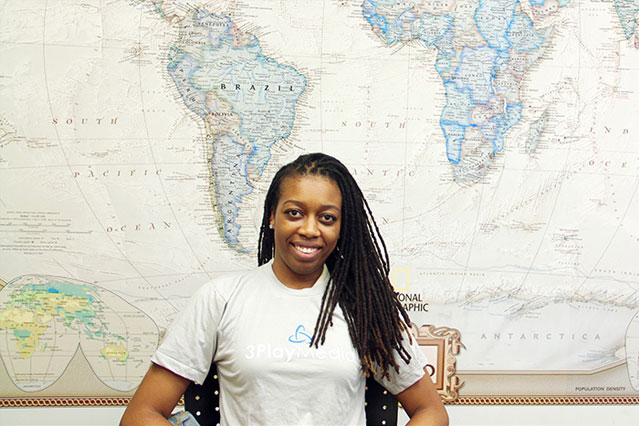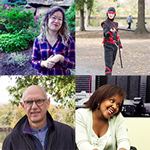Faces Behind the Screen: Nia
Quick Links
<< Return to all “Faces Behind the Screen” stories
We met with Nia during our first round of interviews at Boston University in which we conversed with a handful of people from the Deaf and Hard of Hearing community.
Nia is Deaf, and recently moved to Boston to study Deaf education at BU. She has a strong interest in both language and travel, which makes sense considering her other academic pursuits. She studied languages, linguistics and Italian at Georgetown University, and in addition to Italian, she is also fluent in Spanish and Portuguese.
Below is a video from our interview with Nia in which she signed her responses. The text in this story is transcribed from her interpreter’s voice:
Did your strong interest in learning languages stem from a passion for traveling?
Well, I learn languages because I like to be able to communicate with people in their own language.
If you can use the language, it’s a simple emotional connection instead of just using English with that person. Because that’s not as authentic, it’s not as real.
So, I think it’s really important to learn the languages when you’re traveling to other countries and interacting with people that you meet. I really feel like that’s more respectful [towards] them and their culture. I really feel like I don’t want to take over their space in that way.
Also, […] I’m really just crazy about language in general.
“It’s been a new experience for me to use interpreters to speak, because that means I have to give that trust to interpreters.”
As an experienced linguist, how does it feel to have your words translated by an interpreter?
Well, when I was growing up, I never really had to use an interpreter to voice. I used interpreters to know what other people were saying […] But [when I started at BU] I decided to use my own language, ASL, and that’s my primary language here. That’s what I’m living in and with. My classmates, my peers are all using sign language.
It’s been a new experience for me to use interpreters to speak, because that means I have to give that trust to interpreters. And I have to learn that it’s not a big deal. And yeah, I believe that interpreters are very qualified and they’ll do a good job. And at first it felt odd. It did. But now it’s part of my identity, part of who I am, and part of my language.
You once took an Italian class without CART (computer-aided real-time translation) or interpreters. What is it like depending on you lipreading skills in class?
Some of my teachers were pretty good with interacting with me on that force [lipreading].
Other places, it was more of a frustrating experience. But I just had to grit my teeth and bear it, because I really loved the [Italian] language and I wanted to be there.
Was there ever a time when there was a miscommunication, misunderstanding, or when someone was unwilling to communicate with you?
All the time — that’s part of my life.
“They’d get mad at me because I was Deaf.”
What is your earliest memory of that happening?
My earliest memory… I would say, high school. I skipped middle school because I went to a school for the Deaf in middle school.
Some of my classmates just wouldn’t speak very clearly, and I also would misunderstand what they were saying, and they would get frustrated with me and make me feel uncomfortable. They’d get mad at me because I was Deaf. Even though I could speak and communicate clearly with them, I couldn’t understand what they were saying back to me. So, that was always my issue.
It really was very frequent… that they would understand me, but I wouldn’t understand them. And I would always feel inconvenient, or bad, or guilty. And I shouldn’t have had to feel guilty.
Then later, I just learned that it’s my job to really just tell people directly that if they weren’t willing to communicate with me, I’d have to just tell someone close to me, you know, just don’t get upset with me. It’s really not my fault that I don’t understand you. It’s not my fault that you’re not willing to not meet my communication needs and be more creative about texting, using an iPhone, an iPad, gesturing, or something, some kind of sign.
So, my earliest memory would be just feeling guilty for not understanding a person and what they just said.
However, being deaf doesn’t mean you are unaware of your surroundings.
I guess when you become deaf, you just learn how to deal with things like emergencies, and sounds, and alerts.
You have a sense that you develop, that changes over time, too. You feel it, you have an intuitive sense about knowing — and I’m not trying to say everyone has this sixth sense, but you learn how to deal with things through feeling. And where people would depend on their hearing, we don’t. We depend on our sense of tactility and our senses of the body.
“I think about it every day. I feel blessed to be Deaf. And I just couldn’t imagine not being Deaf.”
What is the best part about being Deaf?
Seeing the world. It’s a visual world. You are bi-cultural. I love it. I think about it every day. I feel blessed to be Deaf. And I just couldn’t imagine not being Deaf.
—
NOTE: This page was originally published on 1/24/2017 and was updated 1/12/2018.
We want to extend a huge thank you to Boston University and the Howard Thurman Center for Common Ground for hosting this series of interviews.
Faces Behind the Screen is a storytelling project focusing on members of the Deaf and hard of hearing community.





